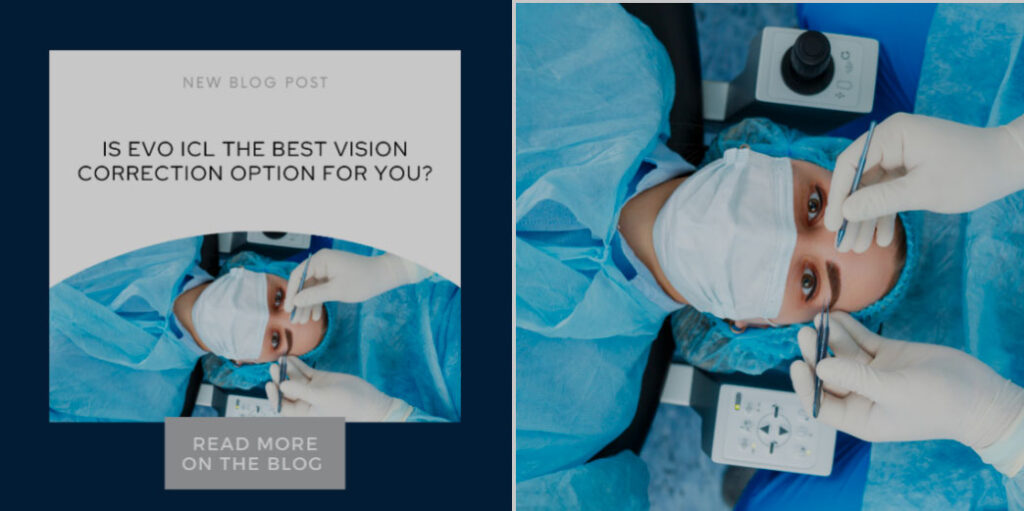Posted by: SightTrust Eye Institute in EVO ICL, LASIK

For individuals struggling with nearsightedness (myopia), the quest for clear vision often leads to various corrective options. Glasses and contact lenses are common solutions, but many seek an alternative to lenses. While LASIK and PRK have long been popular choices for vision correction, an increasingly preferred option is the EVO Implantable Collamer Lens (ICL). If you’re considering vision correction surgery, understanding phakic intraocular lenses like the EVO ICL can help determine if it’s the right choice for you.
What Are Phakic Intraocular Lenses?
Phakic intraocular lenses (pIOLs) are implantable lenses designed to improve vision by working in conjunction with the eye’s natural lenses. Unlike traditional intraocular lenses used in cataract surgery (which replace the eye’s natural lens), phakic IOLs are placed just above the natural lenses. This approach helps maintain the eye’s ability to focus naturally while providing sharp, long-lasting vision correction.
What Is the EVO ICL?
The EVO Implantable Collamer Lens (ICL) is an advanced phakic IOL designed to correct moderate to severe myopia and astigmatism. Made from a biocompatible material called Collamer, the EVO ICL offers a high level of optical clarity while being gentle on the eye. Unlike other refractive surgeries that reshape the cornea, the EVO ICL is implanted behind the iris and in front of the eye’s natural lens, where it remains invisible and provides sharp vision correction.
Advantages of EVO ICL:
- Reversible Procedure: Unlike LASIK or PRK, the EVO ICL can be removed if necessary.
- UV Protection: The Collamer material naturally blocks UV rays, adding an extra layer of eye protection.
- Suitable for Thin Corneas: Patients with thin corneas, who may not be ideal candidates for LASIK, often qualify for EVO ICL.
- Sharp, High-Definition Vision: Many patients experience superior night vision and contrast sensitivity.
- No Dry Eye Issues: Unlike LASIK, which may exacerbate dry eye symptoms, the EVO ICL does not affect tear production.
How Does EVO ICL Compare to Other Vision Correction Methods?
EVO ICL vs. LASIK
LASIK reshapes the cornea to correct vision but requires sufficient corneal thickness and can cause dry eye syndrome. EVO ICL, however, is suitable for individuals with thin corneas and does not contribute to dry eye symptoms. Unlike LASIK, which permanently alters the cornea, EVO ICL is a reversible solution.
EVO ICL vs. PRK
PRK removes the corneal surface layer to reshape it, requiring a longer recovery time. While PRK may be an option for those who cannot undergo LASIK, EVO ICL offers a reversible alternative with immediate vision improvement and a less invasive recovery process.
EVO ICL vs. Contact Lenses
Contact lenses require daily maintenance and can increase the risk of infections. EVO ICL eliminates this hassle, providing long-term vision correction and superior stability, especially for individuals with severe myopia.
Is EVO ICL Right for You?
The EVO ICL is ideal for individuals who:
- Are between 21 and 45 years old.
- Have moderate to severe nearsightedness (-3.00 to -20.00 D) with or without astigmatism.
- Have stable vision with no significant prescription changes.
- Are not ideal candidates for LASIK due to thin corneas or dry eyes.
However, the procedure may not be suitable for individuals with hyperopia (farsightedness) or certain eye conditions. A comprehensive consultation at SightTrust is essential to determine if you are eligible for this amazing technology.
Phakic intraocular lenses like the EVO ICL provide a safe, effective, and reversible vision correction option for individuals with myopia. With advantages over LASIK, PRK, and traditional contact lenses, the EVO ICL is gaining popularity as a long-term solution for clear vision. If you’re considering vision correction surgery, consulting a specialist at SightTrust can help you explore whether EVO ICL is the best option for your eyes and lifestyle.
Are you ready to experience a new level of visual clarity? Contact SightTrust today to schedule a consultation and take the first step toward better vision!






